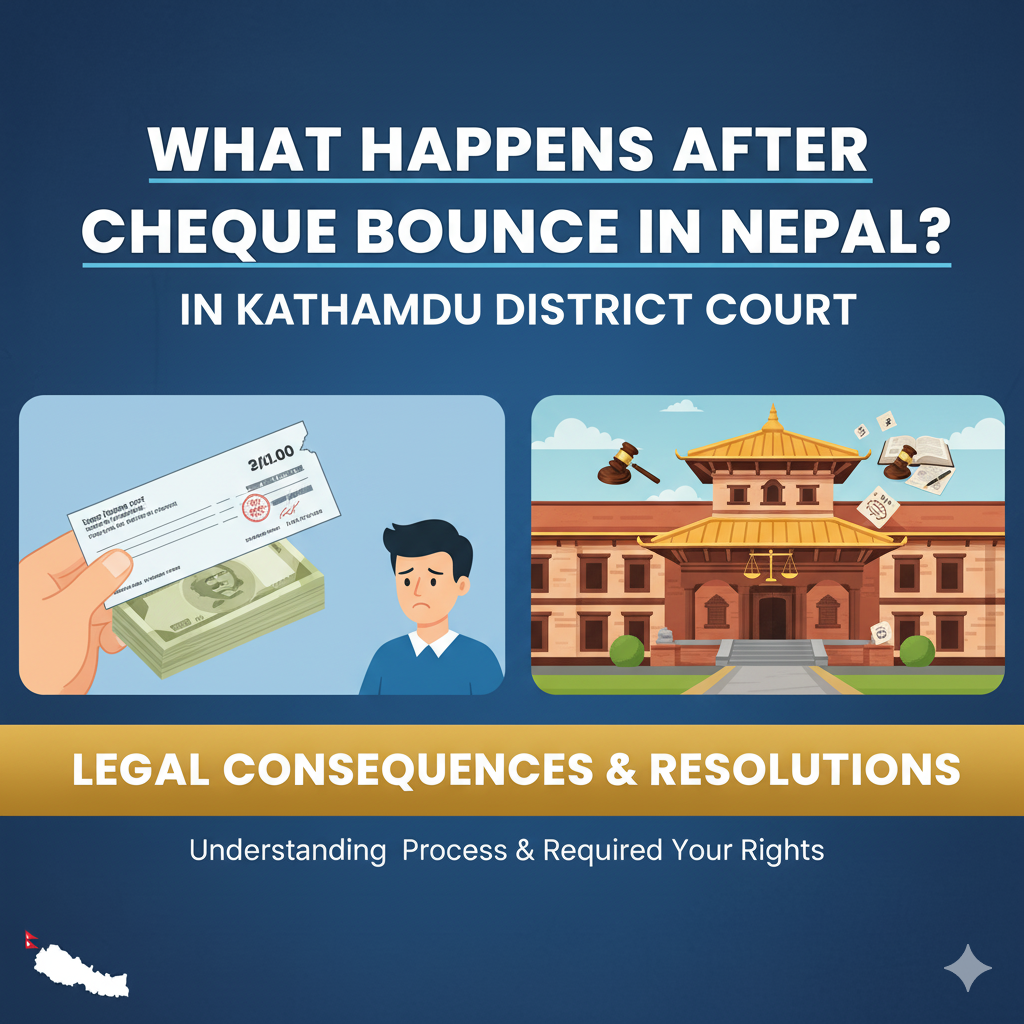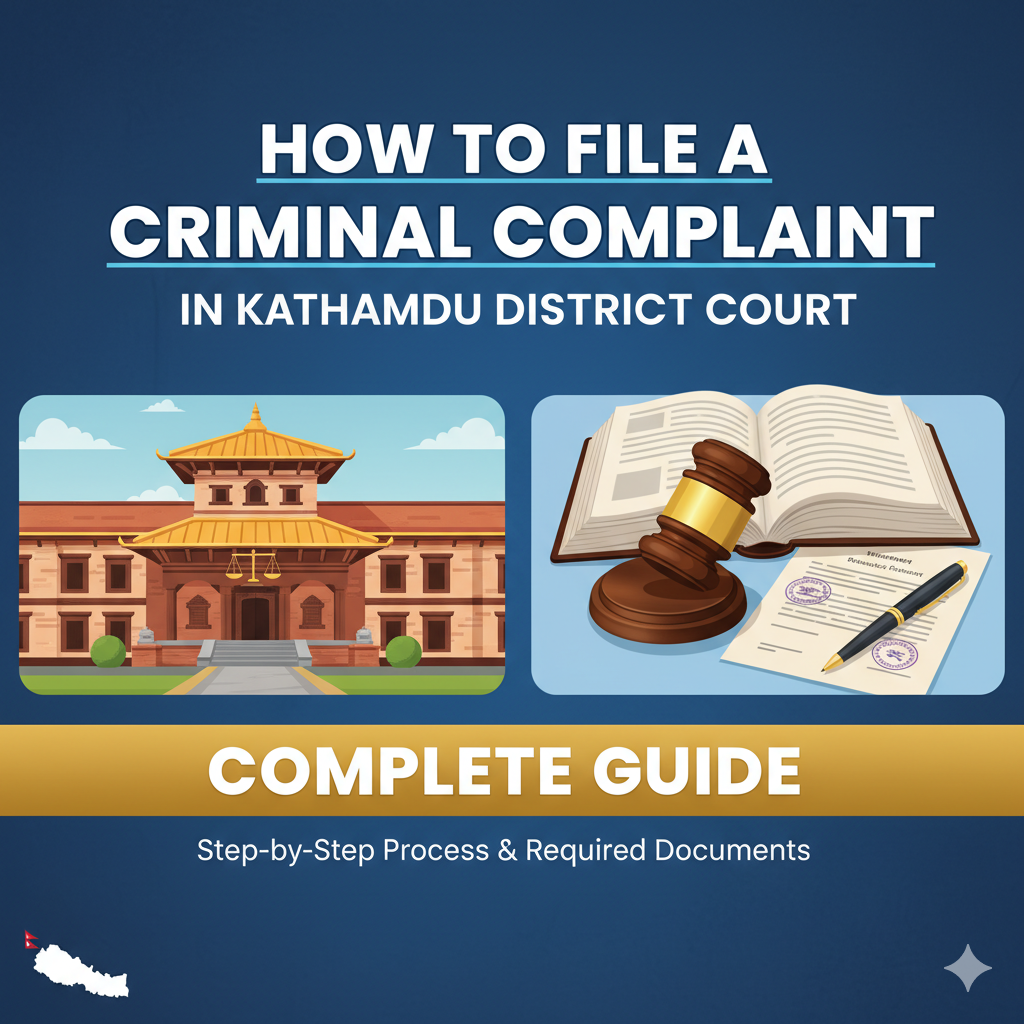
Introduction
What Happens After Cheque Bounce in Nepal? Cheque bounce incidents are increasingly common in Nepal’s financial landscape, affecting both individuals and businesses. When a cheque is dishonored, it triggers a series of legal and financial consequences governed by specific provisions in Nepalese law. This comprehensive guide explores what happens after a cheque bounces in Nepal, detailing the legal framework, procedural requirements, and remedies available to both parties involved in such transactions.
Whether you’re a creditor dealing with a dishonored cheque or a debtor facing potential legal action, understanding the complete process is crucial for protecting your rights and navigating the legal system effectively. This article provides detailed insights into the cheque bounce scenario in Nepal, helping you make informed decisions when faced with such situations.
Understanding Cheque Bounce in Nepal
What Constitutes a Cheque Bounce?
A cheque bounce occurs when a bank refuses to honor a cheque presented for payment due to specific reasons. In Nepal, this typically happens when:
- Insufficient funds are available in the drawer’s account
- The cheque amount exceeds the agreed overdraft limit
- The signature on the cheque doesn’t match bank records
- The cheque has expired (typically 6 months from the date of issue)
- There are alterations or overwriting on the cheque without proper authentication
- The account has been closed or frozen
Common Causes of Cheque Bounce in Nepal
Understanding why cheques bounce can help prevent such incidents:
- Financial mismanagement leading to insufficient funds
- Intentional default despite having funds
- Post-dated cheques presented before the due date
- Technical errors in cheque filling
- Disputes between parties regarding payment terms
- Banking errors (though rare)
Legal Framework Governing Cheque Bounce in Nepal
The Negotiable Instruments Act, 2027 (1971)
The primary legislation governing cheque bounce cases in Nepal is the Negotiable Instruments Act, 2027 (1971). Key provisions include:
- Section 123: Defines cheque as a bill of exchange drawn on a specified banker and payable on demand
- Section 138: Deals with the consequences of cheque bounce
- Section 139: Prescribes the procedure for filing a complaint
- Section 140: Outlines the penalties for cheque bounce offenses
Nepal Rastra Bank Directives
The central bank of Nepal issues periodic directives to commercial banks regarding cheque clearing procedures and handling of dishonored cheques. These directives complement the legal framework and provide standardized procedures for banks to follow.
Relevant Provisions of the Criminal Code
While the Negotiable Instruments Act primarily addresses cheque bounce, certain provisions of the Criminal Code may also apply in cases involving fraudulent intentions.
Criminal and Civil Consequences of Cheque Bounce
Criminal Proceedings
Under Nepalese law, cheque bounce is considered a criminal offense with the following consequences:
- Imprisonment up to one year
- Fine up to double the cheque amount
- Criminal record that may affect future financial transactions
- Potential impact on creditworthiness
Civil Liability
Beyond criminal consequences, the drawer also faces civil liability:
- Obligation to pay the original cheque amount
- Payment of interest as specified in the agreement or as determined by the court
- Potential damages if the bounce caused financial harm to the payee
- Legal costs incurred by the payee in recovering the amount
Step-by-Step Process After Cheque Bounce
1. Bank Notification
When a cheque bounces, the bank follows this procedure:
- The payee’s bank returns the dishonored cheque with a memo stating the reason for non-payment
- The payee receives a “Cheque Return Memo” from their bank
- This memo serves as evidence that the cheque was dishonored
2. Legal Notice to the Drawer
Within 30 days of receiving the cheque return memo:
- The payee must send a legal notice to the drawer demanding payment
- The notice must be sent through registered post
- It should state the facts of the case and demand payment within 15 days
- The notice should mention that legal action will follow if payment isn’t made
3. Drawer’s Response
Upon receiving the legal notice:
- The drawer has 15 days to make the payment
- If payment is made within this period, the matter is resolved
- If payment isn’t made, the drawer may face legal proceedings
4. Filing a Complaint
If the drawer doesn’t respond to the legal notice:
- The payee can file a complaint in the appropriate court within 30 days
- The complaint must be filed in the jurisdiction where the bank is located
- The court will then issue summons to the drawer
5. Court Proceedings
Once the complaint is filed:
- The court examines the evidence provided by both parties
- If prima facie case is established, the court may issue summons
- The drawer must appear in court and present their defense
- The court may order payment, impose fines, or sentence imprisonment based on the evidence
Rights and Remedies Available to the Payee/Creditor
Legal Recourse Options
The payee has several options when faced with a bounced cheque:
- File a criminal complaint under Section 138 of the Negotiable Instruments Act
- Initiate civil proceedings to recover the amount
- Negotiate a settlement with the drawer
- Approach alternative dispute resolution mechanisms
Evidence Collection
To strengthen their case, payees should:
- Preserve the original dishonored cheque
- Keep the bank return memo safe
- Maintain records of all communications with the drawer
- Document any previous payment history or agreements
- Keep receipts for legal notice and court fees
Recovery Options
Beyond legal proceedings, payees can explore:
- Negotiated settlements with interest
- Structured payment plans
- Mediation through banking ombudsman
- Arbitration if previously agreed in the contract
Defenses Available to the Drawer/Debtor
Valid Legal Defenses
Drawers can present several defenses against cheque bounce allegations:
- Insufficient notice period before legal action
- Dispute regarding the underlying transaction
- Cheque issued as security rather than payment
- Fraudulent alteration of the cheque amount
- Force majeure circumstances preventing payment
- Bank errors resulting in dishonor
Procedural Defenses
Procedural issues that can be raised as defenses:
- Defects in the legal notice sent by the payee
- Delay in filing the complaint beyond the statutory period
- Jurisdictional challenges
- Improper service of summons
Settlement Options
Drawers facing cheque bounce cases can consider:
- Negotiating a payment plan with the payee
- Requesting mediation through the court
- Offering collateral or security for future payments
- Proposing alternative dispute resolution methods
Penalties, Fines, and Imprisonment Terms
Statutory Penalties
Under Nepalese law, penalties for cheque bounce include:
- Imprisonment for up to one year
- Fine up to twice the cheque amount
- Both imprisonment and fine may be imposed together
- Additional compensation as determined by the court
Factors Influencing Penalty Severity
Courts consider several factors when determining penalties:
- Amount involved in the cheque bounce
- Previous criminal record of the drawer
- Intent behind the dishonor (deliberate vs. circumstances beyond control)
- Cooperation with the investigation
- Efforts made to settle the matter
Compounding the Offense
In certain circumstances:
- The offense may be compounded if the drawer pays the amount
- The court may reduce penalties upon full payment
- Settlement between parties may influence the final judgment
How to Prevent Cheque Bounce Situations
For Drawers
To avoid cheque bounce incidents:
- Maintain sufficient balance in accounts
- Set up account alerts for low balances
- Regularly reconcile bank statements
- Use post-dated cheques carefully
- Communicate with payees about potential delays
- Consider alternative payment methods when funds are uncertain
For Payees
To minimize risk of receiving bounced cheques:
- Verify the drawer’s financial credibility
- Request account verification before accepting cheques
- Implement a verification process for large amount cheques
- Consider electronic payment alternatives
- Include specific clauses in agreements regarding cheque dishonor
- Maintain records of all cheque transactions
Best Practices for Both Parties
- Clear communication regarding payment expectations
- Written agreements specifying payment terms
- Regular follow-ups on pending payments
- Documentation of all financial transactions
- Consideration of escrow arrangements for significant transactions
Recent Legal Updates and Amendments
2023 Amendment to Negotiable Instruments Act
Recent changes to the legal framework include:
- Introduction of electronic notice provisions
- Streamlined procedures for small-value cheques
- Enhanced protection for senior citizens in cheque bounce cases
- Provision for alternative dispute resolution in certain cases
Nepal Rastra Bank’s 2022 Directive
The central bank introduced:
- Standardized formats for cheque return memos
- Mandatory timelines for banks to process cheques
- Digital verification processes for cheques
- Enhanced customer grievance mechanisms
Judicial Trends
Recent court decisions show:
- Stricter interpretation of notice period requirements
- Increased emphasis on settlement between parties
- Greater consideration of the drawer’s financial situation
- More consistent application of penalty provisions
Frequently Asked Questions
How long does a cheque bounce case take in Nepal?
The duration varies depending on court backlog and complexity, but typically:
- Initial notice period: 15 days
- Time to file complaint: 30 days
- Court proceedings: 6 months to 2 years
- Appeals: Additional 1-2 years
Can I settle a cheque bounce case out of court?
Yes, cheque bounce cases can be settled out of court through:
- Direct negotiation between parties
- Mediation facilitated by the court
- Arbitration if previously agreed
- Settlement through banking ombudsman
What if the cheque was issued as security?
Cheques issued as security are treated differently:
- The payee must prove the underlying transaction
- The drawer can argue that the cheque wasn’t meant for payment
- Courts examine the context and purpose of the cheque
- Evidence of the security arrangement is crucial
Is cheque bounce a criminal offense in Nepal?
Yes, cheque bounce is a criminal offense under:
- Section 138 of the Negotiable Instruments Act
- Can result in imprisonment up to one year
- Fine up to double the cheque amount
- Both penalties may be imposed together
Can a company be prosecuted for cheque bounce?
Yes, companies can be prosecuted for cheque bounce:
- The legal action is against the company
- Directors may also be held liable in certain circumstances
- The company’s assets may be seized for payment
- Criminal proceedings can affect business operations
Conclusion
Navigating cheque bounce cases in Nepal requires understanding both the legal framework and practical considerations. For payees, prompt action following proper procedures is essential for successful recovery. For drawers, understanding rights and potential defenses can help mitigate consequences.
The key takeaways are:
- Cheque bounce is a criminal offense with serious consequences in Nepal
- Proper notice procedures must be followed before initiating legal action
- Both parties have specific rights and remedies under the law
- Settlement options exist and should be explored before litigation
- Prevention is always better than dealing with the aftermath
Whether you’re dealing with a bounced cheque or want to prevent such incidents, consulting with a legal professional specializing in financial law can provide tailored advice for your specific situation.
Disclaimer: This article provides general information about cheque bounce laws in Nepal and should not be considered legal advice. Laws may change over time, and specific situations may require different approaches. Please consult with a qualified legal professional for advice tailored to your particular circumstances.



